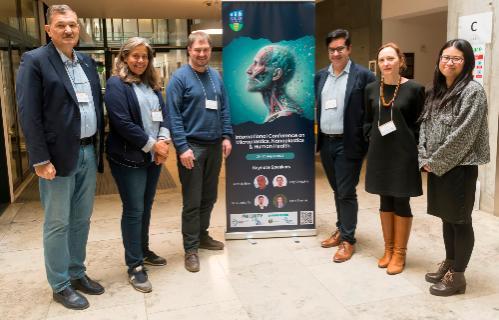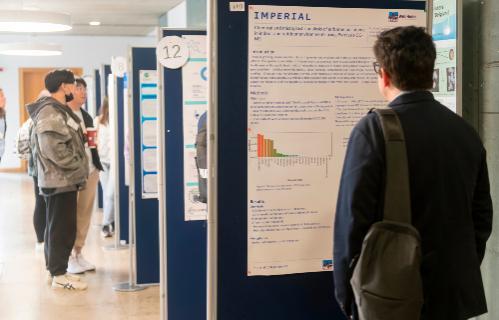 The International Conference on Microplastics, Nanoplastics (MNPs) and Human Health at UCD (28-30 August), brought global experts across disciplines together with a range of stakeholders to explore the consequences of exposure to MNPs.
The International Conference on Microplastics, Nanoplastics (MNPs) and Human Health at UCD (28-30 August), brought global experts across disciplines together with a range of stakeholders to explore the consequences of exposure to MNPs.
The conference was led by Dr Junli Xu, with Professor Aoife Gowen UCD School of Biosystems & Food Engineering and Dr Amy O’Higgins UCD School of Medicine. Dr Xu said, “Microplastics are now known to be ubiquitous, yet there remains insufficient global data to establish clear causation or correlation with human health. All conference participants highlighted the need for inter- and transdisciplinary collaborations to accelerate scientific advancements and deepen our understanding in this field.”
The programme’s keynote speakers included Professor Emeritus Jacob de Boer, Vrije Universiteit Amsterdam, Professor Amy O’Higgins and Professor Kevin Thomas, The University of Queensland, and stakeholders were invited to take part in collaborative discussion on policy recommendations to tackle plastic pollution.
Prof de Boer delivered the plenary lecture on 'Plastic Pollution – Human Health vs. Environment', telling the conference that current levels of microplastics are around 100 times higher than the levels of other chemicals in the environment. He highlighted how microplastics can enter the body through food items, including certain fruit, and be ingested via plastic water bottles, which he said contain a lot of microplastics. He emphasised that a significant amount of research work needs to be done in order to establish the exact toxic effects of microplastics on humans.
Microplastics can contaminate organs, conference told via @RTENews https://t.co/zeT2beE7pa
— Fergal Bowers (@FergalBowers) August 29, 2024
In her keynote speech, Prof Amy O’Higgins, UCD School of Medicine, focussed on the exposure of microplastics at the beginning of life, with particular incidence in pregnant women. Her lecture focussed on the potential for MNPs to cross physical barriers and influence development.

The second day focussed on evidence of environmental microplastic pollution, with talks exploring the release of microplastics in indoor football fields, estuarine accumulation, and in several plastic products, including water bottles.
Prof Kevin Thomas discussed the release of MNPs in dishwashers, domestic laundry dryers, and several drinks including beer, wine and bottled water, and release in plastic containers based on temperature. He advocated for the standardisation of methodologies, reporting and communicating such data going forward.
The conference also saw attendees engage in a workshop using methodologies and technologies available at UCD. Participants were invited to measure samples in the lab and use software (i.e., MATLAB) developed by the organising team, to measure, characterise and draw conclusions from the samples analysed. There were sessions exploring methodologies for the analysis of MNPs including both a low-cost design (EnderScope) and state-of-the-art methods (Optical Photothermal Infrared – OPTIR) for MNPs detection.
Invited speaker Dr Elvis Okoffo commented, "The conference provided a unique platform to engage with leading experts and emerging researchers in the field, to explore the latest research developments, and to discuss the significant challenges and opportunities related to microplastics and nanoplastics research. The diverse range of presentations, including those on cutting-edge analytical techniques and the latest findings on human and environmental exposure to these pollutants, was impressive. I was particularly engaged by Dr Junli Xu's workshop on fundamentals of O-PTIR: A Breakthrough in Spectroscopy and data analysis, which provided valuable hands-on experience.”
Conference Chair and Ad Astra Fellow Dr Junli Xu was recently awarded a ERC Award of 1.5 million to investigate how MNPs affect human digestive health. In the lead up to the conference she shared her research insights on Microplastics and Human Health with the Irish Times and The Sunday Times.
Visit the conference website for further information here.